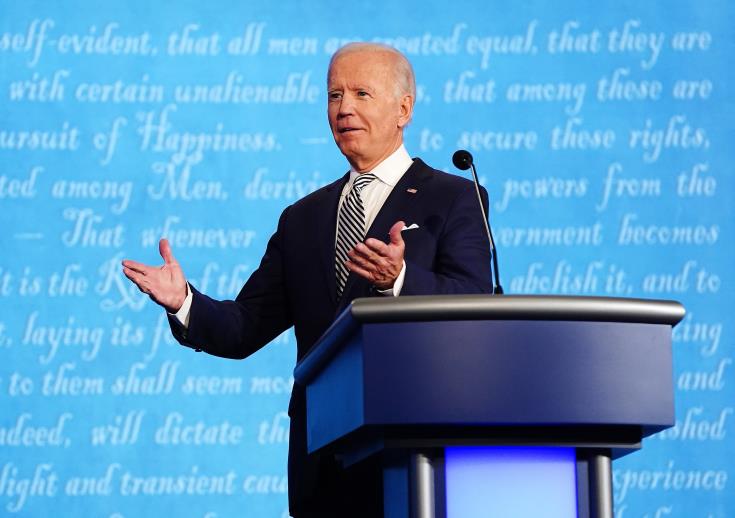Former Cypriot Foreign Minister Dr Erato Kozakou-Marcoullis in an interview with the Financial Mirror argued Cyprus and the wider region can expect positive changes when US President-elect Joe Biden takes over at the Whitehouse from incumbent Donald Trump.
The veteran diplomat also believes that a Biden administration will back the East Med alliance involving Cyprus, Greece, and Israel while the US will be less confrontational towards Europe and NATO.
What change for Cyprus after Biden’s election?
Having served as Ambassador of Cyprus to the US, under both Democratic and Republican administrations with more than 35 years’ experience in diplomacy, including twice as foreign Minister and having known President-elect Joe Biden throughout all these years, I am confident that significant changes for Cyprus will occur in a Biden-Harris administration.
The period of the strong friendship and mutual admiration between Presidents Erdogan and Trump, that gave Erdogan a blank cheque to act the way he wanted in the region, is forever gone.
President Biden, who has a vast experience in Foreign Affairs and a strong record of respect for human rights, the rule of law, diplomacy, and multilateralism, is expected to have a different approach towards Turkey.
President Biden, having served for many years in the Foreign Relations Committee of the Senate, having had a close relationship with the Greek and Cypriot American communities and having visited Cyprus as Vice-President in 2014, will be the first US President with such deep personal knowledge of the Cyprus Problem.
Though President Biden’s utmost priority will be solving the many problems facing the United States at home, he is expected to show a keen interest in many foreign policy priorities, including, to my mind, the situation in the Eastern Mediterranean, which has at its core the solution of the Cyprus issue.
At the end of the day, however, all will depend on what we want the US to do with regards to the solution of this problem.
We must convince that we seek a federal solution and want the United States to contribute towards achieving this goal. Our utmost priorities should remain: To prevent any discussion about a two-state or confederation solution, avert the colonization of Varosha and relaunch the negotiations to finalize a solution based on the agreed basis of a Bizonal, Bicommunal Federation.
Will the US change its policy in the East Med?
Though a Biden administration will bring fundamental changes to US foreign policy, I do not anticipate any major changes in the Balkan policy of the United States, where all countries of the region are orienting their foreign policies toward Euro-Atlantic institutions and many of them are already members of the EU and NATO.
Biden has experience and interest in the region and remains concerned about unresolved conflicts and external influences in the Balkans. As in many other parts of the world, he is expected to pursue a more active US involvement in the region.
On relations between Greece and Turkey, a Biden Presidency would adopt a more hands-on policy towards de-escalation and averting conflict between the two NATO allies.
During the Trump Presidency President Erdogan was able to go ahead with provocative actions in the Eastern Mediterranean, in violation of international law and the sovereign rights of Greece and Cyprus in the region, without any preventive diplomatic action on the part of the US, as was done in the past.
President Biden is expected to change this and make Turkey’s unilateral actions in the Eastern Mediterranean liable to consequences.
The US will return with its leadership in the region and will cooperate closely with NATO and the EU, promoting dialogue and negotiation to achieve stability and avoid threats and tension.
One of his immediate foreign policy priorities will be the Middle East, with Biden seeking to restore the nuclear deal with Iran, brokered during the Obama-Biden administration.
Towards achieving that goal, he will work closely with the EU and the other UNSC Permanent Members.
President Biden is also expected to advocate and play a more active role in materializing a two-state solution in the Israeli-Palestinian conflict, remaining, at the same time, true to his principled position of opposing moves for the annexation of Palestinian territories and expansion of settlements, unlike President Trump who completely ignored the Palestinians and satisfied every demand of Israel.
As was the case with every Democratic and Republican administration, Biden will continue to nurture strong relations with Israel and, in this context, the US will continue to support the trilateral and quadrilateral schemes between Greece, Cyprus, Israel and the US, strengthening cooperation and synergies in many areas, including security and energy issues.
How will Biden’s election affect US relations with the EU?
During the last four years, transatlantic relations have suffered a heavy blow, because of President Trump’s policies, with trade being one of the most contentious issues in EU-US relations.
Disputes such as the imposition of higher tariffs on imported European steel and aluminium products, as well as clashes over subsidies involving aircraft makers, have soured relations and impeded the long-standing transatlantic partnership.
President-elect Biden has already pledged a renewed commitment towards multilateralism and strong cooperation with allies like the EU on key global goals, including climate change, global security, COVID19, China and Iran. A new era in transatlantic partnership is emerging, which will have mutually beneficial effects on a global scale.










